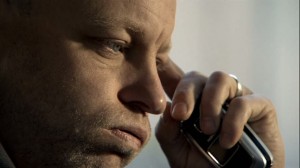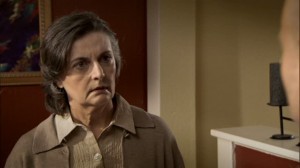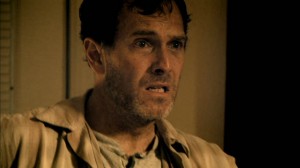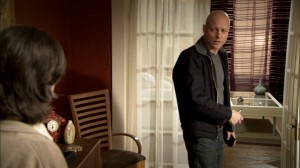Fissure
 When a movie disorients you for 2/3 of its running time, making you feel like you can follow it, but never quite get a handle on it, without ever getting too confused, the eventual explanation is almost always going to be a let down. This is often a consequence of being ambitious, and carrying out those ambitions with financial strings, making sure that the general audience doesn’t pass along the message that your movie is too challenging. The middlebrow needs their grounding, and the concession they expect is a series of clichés eliminating either what original or mysterious approach you’ve brought to the project. But when you’ve made an independent movie, low budget, shot on video, unlikely to receive theatrical distribution, why would a filmmaker sell out to the expectations of the masses, if the masses are never going to see his film?
When a movie disorients you for 2/3 of its running time, making you feel like you can follow it, but never quite get a handle on it, without ever getting too confused, the eventual explanation is almost always going to be a let down. This is often a consequence of being ambitious, and carrying out those ambitions with financial strings, making sure that the general audience doesn’t pass along the message that your movie is too challenging. The middlebrow needs their grounding, and the concession they expect is a series of clichés eliminating either what original or mysterious approach you’ve brought to the project. But when you’ve made an independent movie, low budget, shot on video, unlikely to receive theatrical distribution, why would a filmmaker sell out to the expectations of the masses, if the masses are never going to see his film?
 Russ Pond’s Fissure, an alternate realities sci-fi cop-thriller is one of those movies with no recognizable stars, no money on the screen, and no debt to anyone, so the film’s biggest mystery is why the third act is so generic and obvious. Working from the idea that a Michael Chiklis’ looking cop,* Paul Grunning, suffers from one of the two options for depressed cops in movies, that of the distant-marriage-dead-kid syndrome (the other option is the major alcoholic going through a divorce), Nicholas Turner’s script doesn’t come up with anything fresh for the first fifteen minutes. But we give the movie a little buffer, it’s spare looking and the music is trying hard to amp up the tension, even if we don’t know why. The golden-hued flashbacks detailing the child’s death don’t interfere too much; their inclusion is quite clearly to set up the final scenes. A better choice might have been to just use the flashbacks to explain Grunning’s state of mind without using it as a plot gimmick, but Turner’s script just ties up any possible loose end with pat emotional and convenient explanations.
Russ Pond’s Fissure, an alternate realities sci-fi cop-thriller is one of those movies with no recognizable stars, no money on the screen, and no debt to anyone, so the film’s biggest mystery is why the third act is so generic and obvious. Working from the idea that a Michael Chiklis’ looking cop,* Paul Grunning, suffers from one of the two options for depressed cops in movies, that of the distant-marriage-dead-kid syndrome (the other option is the major alcoholic going through a divorce), Nicholas Turner’s script doesn’t come up with anything fresh for the first fifteen minutes. But we give the movie a little buffer, it’s spare looking and the music is trying hard to amp up the tension, even if we don’t know why. The golden-hued flashbacks detailing the child’s death don’t interfere too much; their inclusion is quite clearly to set up the final scenes. A better choice might have been to just use the flashbacks to explain Grunning’s state of mind without using it as a plot gimmick, but Turner’s script just ties up any possible loose end with pat emotional and convenient explanations.
 Fissure’s frustrating pandering causes the mind to drift, you might think about the laundry or maybe how your car needs a new coat of paint. I flashed back to a totally forgettable and unmemorable thriller from last year, Untraceable, as the house where Diane Lane’s character lives seems to be the exact same location as Detective Grunning spends the majority of Fissure at. He was initially called in to investigate a possible intruder, but every time he enters a different room, he goes through some sort of time warp, so characters who were either dead or possibly committing murders are oblivious and are often freaked out by his presence, especially as it appears he’s shown up before he got the call from his captain.
Fissure’s frustrating pandering causes the mind to drift, you might think about the laundry or maybe how your car needs a new coat of paint. I flashed back to a totally forgettable and unmemorable thriller from last year, Untraceable, as the house where Diane Lane’s character lives seems to be the exact same location as Detective Grunning spends the majority of Fissure at. He was initially called in to investigate a possible intruder, but every time he enters a different room, he goes through some sort of time warp, so characters who were either dead or possibly committing murders are oblivious and are often freaked out by his presence, especially as it appears he’s shown up before he got the call from his captain.
 As a variation on the deliberately alienating low-tech sci-fi hit thriller from 2004, Primer, Fissure keeps its uncontrolled time travel rules as long as it can, but when it breaks them, the excuse is not to find its way out of a story jam, but rather to suck-up to an audience that would never sit through the movie in the first place and in the most syrupy, maudlin way possible. The scientific explanation we are given suggests that Grunning cannot change future events, that he’s a self-aware witness to the inevitable (like a visible ghost), and piecing together the familial drama he’s investigating is fruitless, an intriguing idea for us and no doubt frustrating for him, so there’s no reason for Fissure to eek out a standard conclusion. The fact that, other than Grunning (played by James MacDonald, most of the time well, but occasionally over-the-top), the other characters in Fissure are unpleasant and stiff, fits with the fractured time frame and the notion that they are going through the motions like emotionless robots, means that a disassociated downbeat ending would have been tonally correct. In its current form, Fissure plays as if Fight Club had ended with Ed Norton, Brad Pitt and Helena Bonham Carter smiling adoringly at each other while having a Christmas dinner in front of the fire, with Jingle Bells playing on the soundtrack. Come to think of it, that would’ve been actually darker and more ironic than what they actually used.
As a variation on the deliberately alienating low-tech sci-fi hit thriller from 2004, Primer, Fissure keeps its uncontrolled time travel rules as long as it can, but when it breaks them, the excuse is not to find its way out of a story jam, but rather to suck-up to an audience that would never sit through the movie in the first place and in the most syrupy, maudlin way possible. The scientific explanation we are given suggests that Grunning cannot change future events, that he’s a self-aware witness to the inevitable (like a visible ghost), and piecing together the familial drama he’s investigating is fruitless, an intriguing idea for us and no doubt frustrating for him, so there’s no reason for Fissure to eek out a standard conclusion. The fact that, other than Grunning (played by James MacDonald, most of the time well, but occasionally over-the-top), the other characters in Fissure are unpleasant and stiff, fits with the fractured time frame and the notion that they are going through the motions like emotionless robots, means that a disassociated downbeat ending would have been tonally correct. In its current form, Fissure plays as if Fight Club had ended with Ed Norton, Brad Pitt and Helena Bonham Carter smiling adoringly at each other while having a Christmas dinner in front of the fire, with Jingle Bells playing on the soundtrack. Come to think of it, that would’ve been actually darker and more ironic than what they actually used.
* If Fissure were a big budget movie, it might have been pitched as Vic Mackey goes to Donnie Darkoland.



